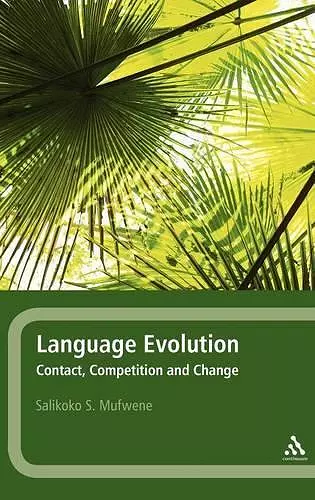Language Evolution
Contact, Competition and Change
Format:Hardback
Publisher:Bloomsbury Publishing PLC
Published:31st Mar '08
Currently unavailable, and unfortunately no date known when it will be back

Language Evolution examines this processes by which languages change, from the macroecological perspective of competition and natural selection.
Examines the processes by which languages change, from the macroecological perspective of competition and natural selection. This work looks at such themes as: natural selection in language; the actuation question and the invisible hand that drives evolution; multilingualism and language contact; and, language birth and language death.Languages are constantly changing. New words are added to the English language every year, either borrowed or coined, and there is often railing against the decline of the language by public figures. Some languages, such as French and Finnish, have academies to protect them against foreign imports. Yet languages are species-like constructs, which evolve naturally over time. Migration, imperialism, and globalization have blurred boundaries between many of them, producing new ones (such as creoles) and driving some to extinction. This book examines the processes by which languages change, from the macroecological perspective of competition and natural selection. In a series of chapters, Salikoko Mufwene examines such themes as:natural selection in language. the actuation question and the invisible hand that drives evolution multilingualism and language contact language birth and language death. the emergence of Creoles and Pidgins the varying impacts of colonization and globalization on language vitality. This comprehensive examination of the organic evolution of language will be essential reading for graduate and senior undergraduate students, and for researchers on the social dynamics of language variation and change, language vitality and death, and even the origins of linguistic diversity.
"This is one of the most important books I have read in the past 10 years. Reading this work is like reorienting oneself to the field anew. It is necessary reading in creole studies and general linguistics."The Journal of Language in Society, 2010
"The scope of this undertaking is ambitious and the result is an opportunity for scholars of comparative literature to consider new types of literary and cultural constellations encompassing national, translational and global movements."The Comparatist
Briefly reviewed in the Year's work in English Studies journal, vol 89, No. 1
'Inspired by evolutionary biology, Salikoko Mufwene's spectacularly comprehensive and thought-provoking new book goes for the big picture and illuminates fundamental principles of language evolution and language contact. Showcasing the peculiar (or not so peculiar, after all) evolutionary conditions of creoles, Mufwene reaches novel and unorthodox insights which build upon concepts such as the importance of ecology, competition and selection, imperfect replication, and family resemblance. He questions and retunes some fundamental notions in linguistics like "system", "transmission" or "acquisition", thus coming considerably closer to an understanding of how language has evolved than earlier linguistic theory. Ingenious imagery like the highway traffic analogy show how patterns have emerged through "invisible hand" evolution, the convergence of communal behavior, and how imperfection, far from being imperfect, generates real-life structures. Principles like the ubiquity of contact and hybridism, the understanding of languages as species and complex adaptive systems, the relationship between mutual accommodation between individuals and emergent communal behavior, or the link between globalization and indigenization invoke a new down-to-earth linguistics in which the interactions of real-life individuals are at the core of far-reaching developments. A must-read for theorists of language change and language contact, and for anybody interested in how language really works.' Professor Edgar W. Schneider, Chair of English Linguistics, University of Regensburg, Germany
"...an interesting reading to anyone working in sociolinguistics and language contact...this is a fascinating book, challenging much received wisdom and packed with innovative analysis of some traditional linguistic issues. It is a must-read especially for those interested in the study of creoles and language contact." - Susan Lixia Cheng, The Linguist List, September 29, 2008 -- Susan Lixia Cheng * Linguist List, The *
"There are also some shortcoming which would have been remedied through rigorous editing, such as the typographical mistake of the word "sztrong" (p. 123). The use of acronyms for some terminologies is also chaotic: the abbreviations don't appear at the first mention of the terms and even when they have been given, in the following part of the book the terns are written out in fill again." - Susan Lixia Cheng, The Linguist List, September 29, 2008 -- Susan Lixia Cheng * Linguist List, The *
ISBN: 9780826493699
Dimensions: unknown
Weight: 300g
376 pages